Almost There: Angelina Jolie in "A Mighty Heart"
 Wednesday, November 10, 2021 at 8:00AM
Wednesday, November 10, 2021 at 8:00AM 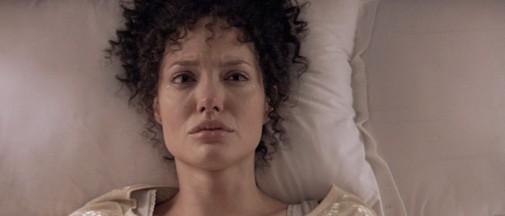
There are few true stars in contemporary Hollywood. Angelina Jolie is arguably one of them, part of a dying breed of movie mythology. Not that it means she's a prolific thespian. For that matter, it's pretty sad how the actress has started to evade our screens in recent years, headlining fewer and fewer projects as time goes by. That being said, Jolie is back in theaters right now, thanks to The Eternals, where she plays an immortal goddess-like figure. It's a delightfully obvious casting choice. In celebration of this occasion, we shall look back. Look back to a time when this Oscar-winning powerhouse was at the high of her visibility and popularity, but the Academy ignored her just the same. In 2007, Jolie seemed like a likely Best Actress nominee for Michael Winterbottom's A Mighty Heart…
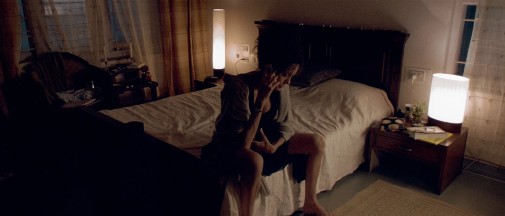
A Mighty Heart dramatizes the real-life tragedy detailed in Mariane Pearl's memoir. In 2002, her husband, Wall Street Journal reporter Daniel Pearl, was kidnapped in Karachi, Pakistan. Supporters of British terrorist Omar Sheikh claimed responsibility for the crime as well as the journalist's eventual murder, a beheading captured on video. It's a horrific story that the picture tells with admirable restraint. Focusing on the procedural aspects of the search for Daniel, Winterbottom portrays the emotional toll such horrors had on everyone involved, paying particular attention to Mariane, who was pregnant at the time of the events.
Jolie's casting provoked an understandable stir and is still a polemic today. Born in France, Mariane Pearl is the daughter of an Afro-Cuban mother and Dutch father, possessing a complex heritage that includes Chinese ancestors. Angelina Jolie is white and wore both a curly wig and brown contact lenses to resemble Mariane better. Justifiably, some have seen this as an example of blackface. For her part, Mariane Pearl has defended Jolie's casting, indicating that the actress was her choice too. For my part, I feel conflicted about the issue but won't write about it further since that's not the focus of this piece. However, if you wish to read more on the subject, I recommend this Seattle Times article published in June 2007.
Issues of miscasting aside, the performance is worthy of much praise.
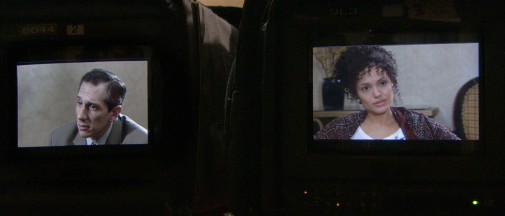
It's easy for an actor to indulge in emotion when portraying such a heightened level of distress as Jolie is asked to do here. But, sagaciously, the actress denies the temptation. Instead, she lets the frustration and pain register through Mariane's skillful avoidances, her shields, and the cracks herein. Reacting to a CNN interview within the film, someone comments that you wouldn't know her husband has been kidnapped for six days by looking at Mariane. Jolie takes that statement to heart and builds her portrayal of a woman in crisis by adopting a strategy that lets the viewer look deeper into the character's behavior to see signs of what's kept at bay. For one of the few modern movie stars, Jolie delivers a very in-star-like performance in A Mighty Heart – that's not a bad thing, mind you.
In other words, the performance represents a tricky resolution to the conundrums intrinsic to a muted character study intent on plumbing the depths of unimaginable sorrow. As Mariane, Jolie plays a crying scene like a person who doesn't want to cry, who doesn't allow the tears to fall through will alone. The deliberate behavioral patterns indicate both obstinance and a survivalist instinct. Thus envisioned by the Winterbottom film, Mariane Pearl isn't an easy character to resolve. She's so intrinsically reactive, so internalized. Another puzzling element is the art of acting how someone listens. Angelina Jolie exudes intelligence as Mariane when the woman is made to assimilate detailed information, her eyes always laser-focused.
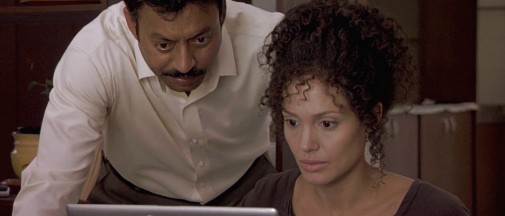
Then, there's the quality of her voice work. At the drop of a hat, without changing her face of determination, a cajoling attitude can bubble over into frustrated anger in the actress' cadence. Or, more tragically, strength may lose its power and flicker out like a flame in the wind. Following that logic, both Jolie and Winterbottom tend to privilege sound over the image when it comes to Mariane's most dispiriting episodes. So often, when she shouts, we only see the back of her head. In another instance, she might remove herself from the scene, leaving everyone, including the camera, behind in an attempt to cool off and keep her inner life a secret.
Shining a light on how Mariane compartmentalizes her worries, Jolie hides the depths of agony behind barely held together stoicism. It gets more apparent as the situation worsens and the effort becomes more strenuous. However, it's there from the start. When Daniel doesn't show up to dinner, Mariane is the perfect hostess, but her smile doesn't reach the eyes. Instead, there's tension in the air, in the lines of her body and movements. Such ominous qualities make the small talk between friends feel like a performance inside another performance. The difference between such falsity and true joy is evident when you see the real thing. Of course, the only place where such positive sentiment exists is in remembrance.
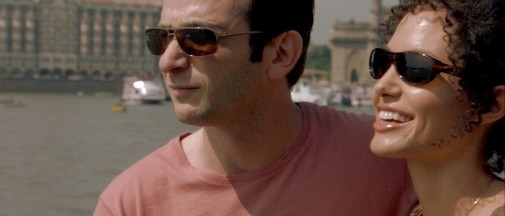
Every scene she shares with Dan Futterman is a light, frothy song of devotion. Subduing her incandescence but still sporting a radiant smile, Jolie evokes sweet ease, allowing us to see Mariane with her guard down. She's joyful and relaxed, her body free of tension and responding to his every move with a show of excitement, a delicate softness reserved for brief interludes alone. In short, Jolie's great at being in love on film, sweeping the audience up in her character's passionate ardor. Yet, when loss manifests, it hurts all the more because we have some idea of what's been taken away.
It's romantic without being sentimental about it, without jeopardizing the rest of the characterization. Tonal variety is essential because the film's focus on suffering can bring about a certain homogeneity of action, a continuous parade of scenes where Jolie is asked to worry while interacting primarily with phones and screens. It's incredible how dynamic she can make all of this, using minute gradations of mood to differentiate scenes, to give the impression of a knot, twisting and tightening ever so slightly with each passing minute.
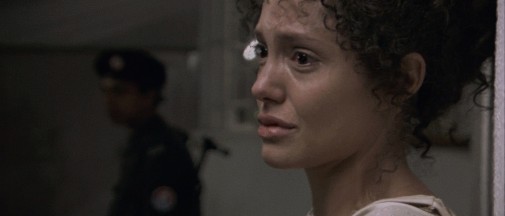
At last, there's "the scene," the most unbearable moment in the entire picture, the most excoriating too. It happens as the widow realizes she's a widow, and it hurts to think of, let alone to watch the thing unfold. Jolie's Mariane swallows down her sobs, her tears threatening to fall at last. We see that mask start to crumble, tremors, and popped veins galore. And then, she exits the scene, as she always does, running away from the camera at this most delicate point. Our gaze still follows her, through it all, chasing after the bereaved woman, thirsty for the fresh blood of grief. When alone, she collapses, screams, exorcising some mighty demons. Some might call the cry an example of catharsis, but that doesn't do it justice. It's too shattered to be cathartic.
Instead, it's ragged and wretched, so raw one can feel how it ravages the actress' throat. Then comes another wave, a tsunami, a flash of denial. Mariane returns to the other people around and talks as if bargaining for a different fate. Jolie's eyes shine with tears, naked despair vibrating off their bugged-out frenzy. As the news of the video hit, incredulity sets in. It breaks down into a spark of rage, dying down quickly until all we're left with is an exhausted person, emptied of feeling, grief in its purest form. There's no more energy left, not even enough to cry a lonely tear, to whimper. It's some of the best work Jolie has ever done on-screen, and, in a different world, it would have made one hell of an Oscar clip.
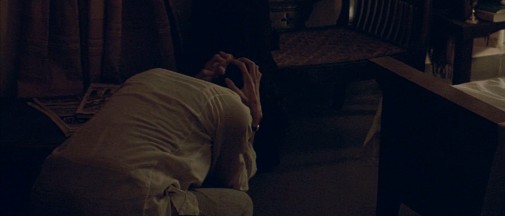
After A Mighty Heart premiered at the Cannes Film Festival, Angelina Jolie quickly earned some well-deserved awards buzz. Speaking strictly of the prominent Oscar precursors, the actress won nominations for the Golden Globes, SAG, and Critics Choice Awards. Nevertheless, on Oscar nomination morning, Jolie's name was nowhere to be found. Instead, AMPAS chose to recognize Cate Blanchett in Elizabeth: The Golden Age, Marion Cotillard in La Vie en Rose, Julie Christie in Away From Her, Laura Linney in The Savages, and Elliot Page in Juno. In the end, the race whittled down to Cotillard vs. Christie, with the French actress triumphing. Linney was the likely fifth-placer despite delivering an outstanding performance, taking Jolie's potential spot in the Best Actress quintet.
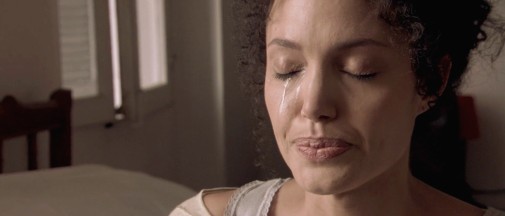
A Mighty Heart is available to rent on Google Play, Youtube, Amazon, and Cineplex.



Reader Comments (14)
Laura Linney was almost certainly in the 5th spot since she had gotten no major citations prior to the Oscar nomination (not even a Golden Globe nod in the Comedy/Musical category despite her costar Philip Seymour Hoffman getting in there), but I agree with you that she’s amazing in that role, so in an ideal world Cate Blanchett would’ve been the one left out of the lineup that year to make way for Jolie (I guess they just couldn’t resist the opportunity to make Cate a double nominee that year).
On a bit of a tangential note, Michael Winterbottom has such an eclectic, interesting filmography that I’m a bit surprised he doesn’t get more recognition.
Page and esp Blanchett out the other 3 are all worthy of the win add in Knightley and Wei.
I also remember Linney coming from out of nowhere and getting in a race that was apparently settled. I also remember Nathaniel calling it and that's when I realized he had powers.
I remember being gutted by this film / Jolie’s performance when I got around to seeing it. She devastated me. It’s a shame they snubbed her for such fine work, but nominated her for Changeling. Even her win … is charismatic, commanding work, but it isn’t as nuanced and layered as her portrayal of Mariane Pearl.
I remember when the end of the movie came and In a Manner of Speaking by Nouvelle Vague began playing and I just lost it. I had to let out a slight sob similar to her devastating scene.
Ah, 2008. The WGA strike effected year that was also the last time that Best Actress and Best Supporting Actress were true jump balls. I remember the lineup taking awhile to take shape, but Jolie was always in the conversation for a summer movie that didn't do well financially (no surprise given the release of such a movie during the summer of sequel-o-rama). But this ended up being a year where all of the ultimate nominees premiered at film festivals (Sundance for The Savages, Berlin for La Vie en Rose, Telluride for Juno, TIFF for Elizabeth: The Golden Age, and the previous year's(!) TIFF for Away from Her) without big hype from any particular corner, so I really felt like it was possible for Jolie to hang on for a nomination, despite lukewarm support down the stretch. I think her performance here is far better and multi-dimensional than either of her Oscar nominated performances and suspect that her miss for A Mighty Heart did boost her into the lineup the next year for Changeling (coupled with Pitt being a contender for Benjamin Button that same year).
What really bugs me is the double dipping with Blanchett who seemed embarrassed by her own clip on Oscar night,it was totally unnecessary when she was so superior in I'm Not There plus had just won and was much better first time round as Elizabeth.
When Tang Wei Keira Knightley and Angelina were right there why do this,reinforces the narrative that they have their pets.
Jolie's best line reading from any film comes from this,the way she says "I love You" when asked what she'd say to her husband by an interviewer.
Truly one of her best performances, better than Girl, Interrupted in my book. Certainly better than Cate Blanchett -- I totally remember her being embarrassed by her clip!
PS: The "miscasting" issue you briefly referenced really annoys me. There is no miscasting here. Should the producers have found an Afro-Cuban-Dutch-Chinese actress to play her? Does such a person exist who can carry a film? Wearing a wig and contact lenses is blackface? Ridiculous.
It's definitely brownface—I mean, look at those stills—but she did give a great performance. As for who else could have played that role? Thandiwe Newton and Sophie Okonedo were right here and both on the world cinema radar at the time (Crash, Hotel Rwanda etc).
Can you do brownface if you don't actually darken your face? And is Thandie newton part Dutch? Is Sophie Okonedo Chinese? See how ridiculous this gets.
I get the hesitance to discuss Jolie's blackface/brownface, and how complex it is given Marianne Pearl's own discussion of it. But, I have to imagine it factored into her missing the nomination. While things are a bit different now, I think the fact that some academy members were uncomfortable with it and with the idea that Jolie would get this role could have cost her the nomination. Even though Pearl chose Jolie, there's something deeply unsettling about the makeup choice here. It's easy to see voters going for someone else in that case.
It's also interesting to consider how, for Marianne, walking through the world as a biracial woman informs the character. It's interesting to consider why she holds back and fights those tears so often.
All that being said, I think this is one of Jolie's top tier performances and she would have been a top tier contender in a great year. Post-Oscar win, Jolie was a big star who mostly starred in films that didn't really deserve her. This was the first film, since Girl Interrupted, that allowed her to show the depth of her acting, rather than just her star power.
Edwin -- I agree about Blanchett. To me, she's the clear weak link in that lineup. Regarding Winterbottom, I haven't seen many of his films, but I tend to agree with that assessment.
Mr Ripley79 -- Tang Wei should have been nominated, for sure. She's sublime in LUST, CAUTION.
Lucky -- I was already starting to follow the Oscars around that time, and remember being shocked at Linney's inclusion.
Philip H. & Nathaniel B -- I prefer her work here to her nominated performances. CHANGELING is rather bad, IMO.
Paranoid Android -- Blanchett's reaction to her own clip was priceless.
Working stiff -- I'd love to have seen Newton in the role. I really love her and wish she got bigger opportunities than she does. She and Okonedo are really great casting suggestions.
Joe G. -- What you say about Pearl's experience as a biracial woman living in the world is present in the original book, according to the Seattle Times article. While it doesn't directly inform the film, it certainly adds another layer to the character's avoidance of overt emotion, how and why she sheds her tears in private. I think the presence of another actress in the role might have illuminated those nuances in a way that Jolie simply can't. Still, as written here, I think it's a great performance. It's a very complicated issue.
As to why I didn't explore it further in the piece, I didn't want it to dominate a piece that's supposed to analyze the performance beyond casting matters. Also, as a white man, I don't feel that it's my place to discuss these issues. So maybe it was a wrong choice, I don't know.
Nathaniel - Did you nominate Jolie this year? It was before my day at TFE.
Also, what would you say are Jolie's best performances?
a) Clearly she did.
b) No, but Thandiwe Newton is a woman of African descent, like Mariane Pearl.
c) Ditto.